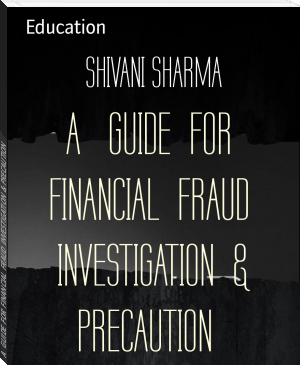A GUIDE FOR FINANCIAL FRAUD INVESTIGATION & PRECAUTION - SHIVANI SHARMA (i love reading books .TXT) 📗

- Author: SHIVANI SHARMA
Book online «A GUIDE FOR FINANCIAL FRAUD INVESTIGATION & PRECAUTION - SHIVANI SHARMA (i love reading books .TXT) 📗». Author SHIVANI SHARMA
E)Fundings – ICOs:-An initial coin offering (ICO) is a means by which funds are raised for a new cryptocurrency venture. An ICO may be used by startups with the intention of bypassing rigorous and regulated capital-raising processes required by venture capitalists or banks. However, securities regulators in many jurisdictions, including in the U.S., and Canada have indicated that if a coin or token is an "investment contract" (e.g., under the Howey test, i.e., an investment of money with a reasonable expectation of profit based significantly on the entrepreneurial or managerial efforts of others), it is a security and is subject to securities regulation. In an ICO campaign, a percentage of the cryptocurrency (usually in the form of "tokens") is sold to early backers of the project in exchange for legal tender or other cryptocurrencies, often Bitcoin or Ether. The coins may ultimately be intended to be used as a medium of payment on a platform or serve some other purpose such as identity verification within an ecosystEM.Russian President Vladimir Putin has approved a timeline for a framework that will regulate initial coin offerings (ICO) and cryptocurrency mining operations
6)Cryptocurrency in business:-Businesses are increasingly adopting receiving payment for goods and services in Cryptocurrency as an alternative to traditional currencies.Services such as those offered by BitPay make it possible for companies of all sizes to integrate receiving Cryptocurrency into their existing payment flows.
7)Cryptocurrency in gaming:- Games, lotteries, online casinos and other online gambling sites that feature Cryptocurrency as either a method of payment or as the winnings paid have steadily increased as its popularity has grown and become widely accepted.
A)Lotteries:- In December 2017 Gibraltar based gaming operator Lottoland launched the worlds first regulated Bitcoin lottery offering a 1000 Bitcoin jackpot. Players still pay in traditional currencies but can receive their winnings in Bitcoin if they choose.In the same month Cryptocurrency members club KingCrypto came to attention after it launched its CryptoLottery brand games as the first to allow players to both pay and win in Cryptocurrency easily using its proprietary methods.
B)Online casinos & dice sites:- Many online casinos and dice sites have launched to take advantage of the popularity of Cryptocurrency however their legitimacy is often questioned because of concerns that they are not fair because of the computer algorithms used to run them. The service Provably fair was created to try and combat the fears of its users that they are not being cheated.
8)Academic studies Journals:-In September 2015, the establishment of the peer-reviewed academic journal Ledger (ISSN 2379-5980) was announced. It covers studies of cryptocurrencies and related technologies, and is published by the University of Pittsburgh.The journal encourages authors to digitally sign a file hash of submitted papers, which will then be timestamped into the bitcoin blockchain. Authors are also asked to include a personal bitcoin address in the first page of their papers.
9)Criticism:- Cryptocurrencies have been compared to ponzi schemes, and economic bubbles,such as housing market bubbles. Howard Marks of Oaktree Capital Management stated in 2017 that digital currencies were "nothing but an unfounded fad (or perhaps even a pyramid scheme), based on a willingness to ascribe value to something that has little or none beyond what people will pay for it", and compared them to the tulip mania (1637), South Sea Bubble (1720), and dot-com bubble (1999). In October 2017, BlackRock CEO Larry Fink called bitcoin an 'index of money laundering'. "Bitcoin just shows you how much demand for money laundering there is in the world," he said.
While cryptocurrencies are digital currencies that are managed through advanced encryption techniques, many governments have taken a cautious approach toward them, fearing their lack of central control and the effects they could have on financial security. Regulators in several countries have warned against cryptocurrency and some have taken concrete regulatory measures to dissuade users. Additionally, many banks do not offer services for cryptocurrencies and can refuse to offer services to virtual-currency companies. While traditional financial products have strong consumer protections in place, there is no intermediary with the power to limit consumer losses if bitcoins are lost or stolen. One of the features cryptocurrency lacks in comparison to credit cards, for example, is consumer protection against fraud, such as chargebacks.
An enormous amount of energy goes into proof-of-work cryptocurrency mining, although cryptocurrency proponents claim it is important to compare it to the consumption of the traditional financial system.There are also purely technical elements to consider. For example, technological advancement in cryptocurrencies such as bitcoin result in high up-front costs to miners in the form of specialized hardware and software. Cryptocurrency transactions are normally irreversible after a number of blocks confirm the transaction. Additionally, cryptocurrency can be permanently lost from local storage due to malware or data loss. This can also happen through the destruction of the physical media, effectively removing lost cryptocurrencies forever from their markets.The cryptocurrency community refers to pre-mining, hidden launches,ICO or extreme rewards for the altcoin founders as a deceptive practice.It can also be used as an inherent part of a cryptocurrency's design. Pre-mining means currency is generated by the currency's founders prior to being released to the public.
The success of some cryptocurrencies has caused multi-level marketing schemes to arise with pseudo cryptocurrencies, such as One CoinPaul Krugman, Nobel winner does not like bitcoin and has repeated numerous times that it is a bubble that will not lasts.
A)Causing a rise in GPU prices:-The sudden increase in cryptocurrency mining has increased the demand of graphics HYPERLINK (GPU) greatly.Popular favorites of cryptocurrency miners such as Nvidia’s GTX 1060 and GTX 1070 graphics cards, as well as AMD’s RX 570 and RX 580 GPUs, have all doubled if not tripled in price – or are out of stock completely.A GTX 1070 Ti which was released at a price of $450 is now being sold for as much as $1100. Another popular card GTX 1060's 6 GB model was released at an MSRP of $250, but it is now being sold for almost $500. RX 570 and RX 580 cards from AMD are out of stock for almost a year now. Miners regularly buy up the entire stock of new GPU's as soon as they are available, further driving prices up.This has caused, in general, a disliking towards cryptocurrency miners by PC gamers and tech enthusiasts.
Nvidia is reportedly asking retailers to do what they can when it comes to selling GPUs to gamers instead of miners. "Gamers come first for Nvidia," said Boris Böhles, PR manager for Nvidia in the German region, in an interview with the German publication ComputerBase. "All activities around our GeForce products are for our core audience. We recommend our trading partners make arrangements to ensure that gamers’ needs are still met in the current climate."
10)History:-In 1983 the American cryptographer David HYPERLINK "https://en.wikipedia.org/wiki/David_Chaum"Chaum conceived an anonymous cryptographic electronic money called ecasts" Later, in 1995, he implemented it through Digicash, an early form of cryptographic electronic payments which required user software in order to withdraw notes from a bank and designate specific encrypted keys before it can be sent to a recipient. This allowed the digital currency to be untraceable by the issuing bank, the government, or a third party.In 1996 the NSA published a paper entitled How to Make a Mint: the Cryptography of Anonymous Electronic Cash, describing a Cryptocurrency system first publishing it in a MIT mailing list and later in 1997, in The American Law Review (Vol. 46, Issue 4).[103]
In 1998, Wei Dai published a description of "b-money", an anonymous, distributed electronic cash system. Shortly thereafter, Nick HYPERLINK "https://en.wikipedia.org/wiki/Nick_Szabo"Szabo created "bit gold". Like bitcoin and other cryptocurrencies that would follow it, bit gold (not to be confused with the later gold-based exchange, BitGold) was an electronic currency system which required users to complete a proof of work function with solutions being cryptographically put together and published. A currency system based on a reusable proof of work was later created by Hal Finney who followed the work of Dai and Szabo.
The first decentralized cryptocurrency, bitcoin, was created in 2009 by pseudonymous developer Satoshi HYPERLINK "https://en.wikipedia.org/wiki/Satoshi_Nakamoto"Nakamoto. It used SHA-256, a cryptographic hash function, as its proof-of-work scheme. In April 2011, Namecoin was created as an attempt at forming a decentralized DNS, which would make internet censorship very difficult. Soon after, in October 2011, Litecoin was released. It was the first successful cryptocurrency to use scrypt as its hash function instead of SHA-256. Another notable cryptocurrency, Peercoin was the first to use a proof-of-work/proof-of-stake hybrid.IOTA was the first cryptocurrency not based on a blockchain, and instead uses the TangleHYPERLINK "https://en.wikipedia.org/wiki/CryptocBuilt on a custom blockchain, The Divi Project allows for easy exchange between currencies from within the wallet and the ability to use personal identifying information for transactions. Many other cryptocurrencies have been created though few have been successful, as they have brought little in the way of technical innovation. On 6 August 2014, the UK announced its Treasury had been commissioned to do a study of cryptocurrencies, and what role, if any, they can play in the UK economy. The study was also to report on whether regulation should be considered.
A)Publicity:-Gareth Murphy, a senior central banking officer has stated "widespread use [of cryptocurrency] would also make it more difficult for statistical agencies to gather data on economic activity, which are used by governments to steer the economy". He cautioned that virtual currencies pose a new challenge to central banks' control over the important functions of monetary and exchange rate policy.Jordan Kelley, founder of Robocoin, launched the first bitcoinHYPERLINK "https://en.wikipedia.org/wiki/Bitcoin_ATM" ATM in the United States on February 20, 2014. The kiosk installed in Austin, Texas is similar to bank ATMs but has scanners to read government-issued identification such as a driver's license or a passport to confirm users' identities. By September 2017 1574 bitcoin ATMs were installed around the world with an average fee of 9.05%. An average of 3 bitcoin ATMs were being installed per day in September 2017.
The





Comments (0)